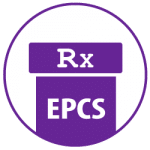EPCS vs Drug Abuse
 EPCS (Electronic Prescribing for Controlled Substances) is starting to help pharmacies in the national war against opioids. Drug abuse is a major national epidemic as declared by the CDC (Centers for Disease Control and Prevention) several years ago. When discussing pharmacy and emerging technologies, perhaps no other profession has effectively embraced new technology better than pharmacy has, as evidenced by EPCS in the the war against prescription drug abuse. Both the emergence of PDMP (Prescription Drug Monitoring Programs) and of EPCS (Electronic Prescribing for Controlled Substances) clearly show how once again the practice of pharmacy is comprised of "early adapters" who are quick to adopt to a better way of doing their jobs.
EPCS (Electronic Prescribing for Controlled Substances) is starting to help pharmacies in the national war against opioids. Drug abuse is a major national epidemic as declared by the CDC (Centers for Disease Control and Prevention) several years ago. When discussing pharmacy and emerging technologies, perhaps no other profession has effectively embraced new technology better than pharmacy has, as evidenced by EPCS in the the war against prescription drug abuse. Both the emergence of PDMP (Prescription Drug Monitoring Programs) and of EPCS (Electronic Prescribing for Controlled Substances) clearly show how once again the practice of pharmacy is comprised of "early adapters" who are quick to adopt to a better way of doing their jobs.
Opioid Epidemic Statistics are Really Scary
In the US over sixty percent (60%) of deaths attributed to drug overdoses involve an opioid and the totals have risen every year since 1999. In fact, since 1999, more than 500,000 Americans have died from an opioid overdose and on average ninety-one (91) people die from opioids daily. According to statistics released by the CDC, the number of opioid prescriptions dispensed quadrupled between 1999 and 2010, and this exactly matches the four time increase seen in the number of fatalities attributed to prescription opioids during the same time span.The CDC statistics perhaps also began to change the way most Americans now view drug abuse and drug overdoses. No longer was it only the illegal heroin addicts and "street junkies" that were dying. Using 2010 as an example, over 38,000 deaths were caused by drug overdoses; yet a staggering 58% (22,000) of these deaths were from prescription medications. Of those 22,000 deaths, over 75% (over 16,000) were attributed to opioid Rx'es.
EPCS - Electronic Prescribing of Controlled Substances
Thanks to the proactive legislation begun by the State of New York in 2012 (NY Assembly Bill 10623 and NY Senate Bill 7637), EPCS is now in place in almost every state across the USA (the only state that it is not currently required is Missouri). Sometimes referred to as the ISTOP law (Internet System for Tracking Over Prescribing), New York mandated that as of March of 2016, all prescriptions in the state were required to be electronically generated (not only Rx'es for controlled substances). Known also as e-prescribing, the law became the model and standard for all states in an attempt to document prescription writing and medication dispensing. It also allowed for data sharing and enhanced communication between law enforcement agencies and the healthcare community to monitor and stop prescription "trafficking" and abuse. EPCS can additionally help in the reduction of potentially lethal drug interactions and dispensing errors, plus allow everyone the ability to "flag" potential abuse by both medical practitioners and patients.Although both physicians and pharmacies are not yet at 100% in compliance in any state, once again NY is leading the way with almost 75% of doctors in the state being e-prescribing enabled and almost 97% of New York's pharmacies being EPCS enabled. Sadly according to Surescripts data, only a little over seventeen percent (17%) of all prescribers and about ninety percent (90%) of all pharmacies are currently EPCS enabled nationally.Yet the momentum for e-prescribing is building. Thanks to new federal legislation, doctors will be forced to prescribe all controlled substances electronically to meet the federal government’s inclusion of e-prescribing in the Medicare Modernization Act (MMA). Basically all physicians who fail to meet an 80% e-prescribing threshold required for Meaningful Use (MU) will face reduced Medicare payments for noncompliance.Additionally, the emergence of PDMP (Prescription Drug Monitoring Programs) are now in place in every state except Missouri and also are helping pharmacists to help battle the war against prescription drug abuse and fight addiction.
Becoming a Certified EPCS-Enabled Pharmacy
Is your pharmacy currently a Certified EPCS Enabled Provider? If the answer is no, then HCC can help your pharmacy become one and get on the list of Certified Providers. We can make sure that your software meets all the requirements of the DEA’s Interim Final Rule and also provide you with a 3rd party audit that ensures that your software meets all EPCS specifications. Plus HCC can provide you with updated written policies and procedures for your P & P manual!If you are like most pharmacy owners and facing the challenges of keeping up with the new and rapidly changing pharmacy technologies, HCC can help. With 28+ years of pharmacy consulting experience and an in-house team that includes both consultant pharmacists and technology experts, HCC can help you make the right decisions in regards to the latest technological advancements that affect pharmacy as both a practice and a business. From major hospitals and healthcare systems to individual community pharmacies, HCC has been the nationally renowned pharmacy consultant firm of choice when it comes to questions regarding technology. From the selection of software to the actual implementation of systems, Healthcare Consultants has both the in-house staff and the experience required to do it right.We urge you to contact us today to see how HCC can help you and your business. With a full-time staff of in-house Pharmacy Consultant specialists, HCC can answer any questions that you may have in all Pharmacy settings. Contact us online or call us today at 800-642-1652 for a free consultation.
